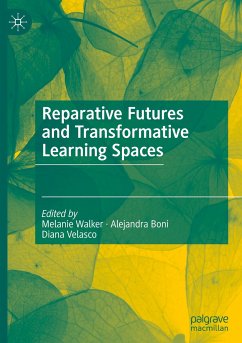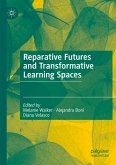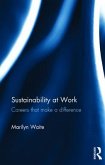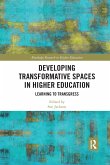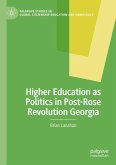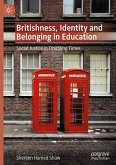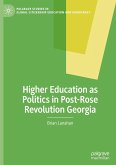Reparative Futures and Transformative Learning Spaces
Herausgegeben:Walker, Melanie; Boni, Alejandra; Velasco, Diana
Reparative Futures and Transformative Learning Spaces
Herausgegeben:Walker, Melanie; Boni, Alejandra; Velasco, Diana
- Gebundenes Buch
- Merkliste
- Auf die Merkliste
- Bewerten Bewerten
- Teilen
- Produkt teilen
- Produkterinnerung
- Produkterinnerung
This edited book draws on an international cohort of authors, all working towards sustainable, decolonizing human development for more just futures in a variety of learning spaces. Integrating sustainable human development with 'reparative futures', the chapters present diverse examples of how transformative learning spaces can be created through different participatory methodologies and with different stakeholders. The book will be of interest to researchers, graduate students, practitioners and policymakers in the areas of higher education, development studies and transformative innovation.
Andere Kunden interessierten sich auch für
![Reparative Futures and Transformative Learning Spaces Reparative Futures and Transformative Learning Spaces]() Reparative Futures and Transformative Learning Spaces119,99 €
Reparative Futures and Transformative Learning Spaces119,99 €![Sustainability at Work Sustainability at Work]() Marilyn WaiteSustainability at Work192,99 €
Marilyn WaiteSustainability at Work192,99 €![Developing Transformative Spaces in Higher Education Developing Transformative Spaces in Higher Education]() Developing Transformative Spaces in Higher Education55,99 €
Developing Transformative Spaces in Higher Education55,99 €![Educating Inequality Educating Inequality]() Robert SamuelsEducating Inequality183,99 €
Robert SamuelsEducating Inequality183,99 €![Higher Education as Politics in Post-Rose Revolution Georgia Higher Education as Politics in Post-Rose Revolution Georgia]() Brian LanahanHigher Education as Politics in Post-Rose Revolution Georgia90,99 €
Brian LanahanHigher Education as Politics in Post-Rose Revolution Georgia90,99 €![Britishness, Identity and Belonging in Education Britishness, Identity and Belonging in Education]() Shereen Hamed ShawBritishness, Identity and Belonging in Education112,99 €
Shereen Hamed ShawBritishness, Identity and Belonging in Education112,99 €![Higher Education as Politics in Post-Rose Revolution Georgia Higher Education as Politics in Post-Rose Revolution Georgia]() Brian LanahanHigher Education as Politics in Post-Rose Revolution Georgia90,99 €
Brian LanahanHigher Education as Politics in Post-Rose Revolution Georgia90,99 €-
-
-
This edited book draws on an international cohort of authors, all working towards sustainable, decolonizing human development for more just futures in a variety of learning spaces. Integrating sustainable human development with 'reparative futures', the chapters present diverse examples of how transformative learning spaces can be created through different participatory methodologies and with different stakeholders. The book will be of interest to researchers, graduate students, practitioners and policymakers in the areas of higher education, development studies and transformative innovation.
Produktdetails
- Produktdetails
- Verlag: Palgrave Macmillan / Springer Nature Switzerland / Springer, Berlin
- Artikelnr. des Verlages: 978-3-031-45805-7
- 1st edition 2023
- Seitenzahl: 304
- Erscheinungstermin: 20. Januar 2024
- Englisch
- Abmessung: 216mm x 153mm x 21mm
- Gewicht: 508g
- ISBN-13: 9783031458057
- ISBN-10: 3031458052
- Artikelnr.: 68848618
- Herstellerkennzeichnung
- Springer-Verlag GmbH
- Tiergartenstr. 17
- 69121 Heidelberg
- ProductSafety@springernature.com
- Verlag: Palgrave Macmillan / Springer Nature Switzerland / Springer, Berlin
- Artikelnr. des Verlages: 978-3-031-45805-7
- 1st edition 2023
- Seitenzahl: 304
- Erscheinungstermin: 20. Januar 2024
- Englisch
- Abmessung: 216mm x 153mm x 21mm
- Gewicht: 508g
- ISBN-13: 9783031458057
- ISBN-10: 3031458052
- Artikelnr.: 68848618
- Herstellerkennzeichnung
- Springer-Verlag GmbH
- Tiergartenstr. 17
- 69121 Heidelberg
- ProductSafety@springernature.com
Melanie Walker is South African Research Chair in Higher Education and Human Development at University of the Free State, South Africa. Alejandra Boni is Full Professor and Deputy Director of INGENIO (CSIC-UPV) at The Polytechnic University of Valencia, Spain, and Extraordinary Professor at University of the Free State, South Africa. Diana Velasco is Research Fellow at INGENIO (CSIC-UPV) at The Polytechnic University of Valencia, Spain.
1. Reparative futures through transformative learning spaces: An intersectional approach for decolonised and sustainable human development (Melanie Walker, Alejandra Boni and Diana Velasco).- 2. Difficult knowledge, post-truth, and reparative futures: Nurturing affective solidarity for transformative learning spaces (Michalinos Zembylas).- 3. Youth voices on social justice: Doing repair work in a South African higher education space (Melanie Walker).- 4. Epistemic resilience: Articulating struggles and dreams from the co-production of knowledge from below between universities and community researchers (Monique Leivas Vargas and Alvaro Fernández-Baldor).- 5. Towards a decolonial and capabilities-based conceptualisation of sustainable educational futures in the Pan-African university: Perspectives from student activists (C. Martinez-Vargas, M. Mathebula, F. Mkwananzi, B. Kibona, T. Malatji, T. Mahlatsi, P. Mmula, N. Khoza, S. Nkosi, B. Ndimba, B. Oamen, A. Buthelezi, M. Maubane, Y. Ngwabeni, and S. Dlamini).- 6. Fostering a reparative international development cooperation system: Transformative learning in a master's degree in development cooperation (Carlos Delgado-Caro, Carola Calabuig-Tormo, and Marta Maicas-Pérez).- 7. The Latin American Hub of Transformative Innovation: A collaborative space promoting collective learning towards more just and sustainable futures (Paloma Bernal-Hernández and Martha Liliana Marín).- 8. Imagining and realising futures in Catalonia: Shared Agendas for just sustainability transitions (Diana Velasco, Míriam Acebillo-Baqué, Alejandra Boni, and Tatiana Fernández).- 9. Peacebuilding as democratic political education: From archive to repertoire (Stephen Esquith and Weloré Tamboura).- 10. Reparative threads that open change futures: Experiences of sexual and gender diversity (Fernando Altamira Basterretxea, Esther Canarias Fernández-Cavada, Ricardo Fernández Quintana and Nelsy Elizabeth Sandoval Díaz).- 11. Philosophical inquiry and the childness of communities: Connective capabilities for flourishing education (Marina Santi and Elisabetta Ghedin).- 12. Transformative learning spaces and capabilities for reimagined and reparative futures in multiple systems (Alejandra Boni, Melanie Walker, and Diana Velasco).
1. Reparative futures through transformative learning spaces: An intersectional approach for decolonised and sustainable human development (Melanie Walker, Alejandra Boni and Diana Velasco).- 2. Difficult knowledge, post-truth, and reparative futures: Nurturing affective solidarity for transformative learning spaces (Michalinos Zembylas).- 3. Youth voices on social justice: Doing repair work in a South African higher education space (Melanie Walker).- 4. Epistemic resilience: Articulating struggles and dreams from the co-production of knowledge from below between universities and community researchers (Monique Leivas Vargas and Alvaro Fernández-Baldor).- 5. Towards a decolonial and capabilities-based conceptualisation of sustainable educational futures in the Pan-African university: Perspectives from student activists (C. Martinez-Vargas, M. Mathebula, F. Mkwananzi, B. Kibona, T. Malatji, T. Mahlatsi, P. Mmula, N. Khoza, S. Nkosi, B. Ndimba, B. Oamen, A. Buthelezi, M. Maubane, Y. Ngwabeni, and S. Dlamini).- 6. Fostering a reparative international development cooperation system: Transformative learning in a master's degree in development cooperation (Carlos Delgado-Caro, Carola Calabuig-Tormo, and Marta Maicas-Pérez).- 7. The Latin American Hub of Transformative Innovation: A collaborative space promoting collective learning towards more just and sustainable futures (Paloma Bernal-Hernández and Martha Liliana Marín).- 8. Imagining and realising futures in Catalonia: Shared Agendas for just sustainability transitions (Diana Velasco, Míriam Acebillo-Baqué, Alejandra Boni, and Tatiana Fernández).- 9. Peacebuilding as democratic political education: From archive to repertoire (Stephen Esquith and Weloré Tamboura).- 10. Reparative threads that open change futures: Experiences of sexual and gender diversity (Fernando Altamira Basterretxea, Esther Canarias Fernández-Cavada, Ricardo Fernández Quintana and Nelsy Elizabeth Sandoval Díaz).- 11. Philosophical inquiry and the childness of communities: Connective capabilities for flourishing education (Marina Santi and Elisabetta Ghedin).- 12. Transformative learning spaces and capabilities for reimagined and reparative futures in multiple systems (Alejandra Boni, Melanie Walker, and Diana Velasco).

